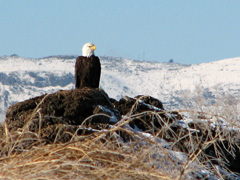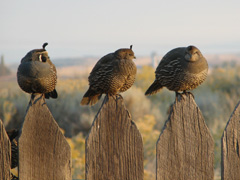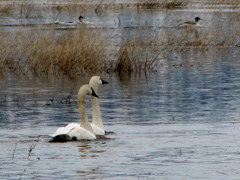|
Winema Lodge is in the heart of the Pacific Flyway, the most important migratory bird location
on the West Coast. 489 species of wildlife live in the Klamath Basin, and
our lodge is right in the midst of the habitat on farmland and wildlife
refuges. Klamath Basin has the largest concentration of waterfowl in North
America, bringing bird watchers to stay at the lodge, which is seconds from
the Tule Lake Fish and Wildlife Refuge.
Right across the road from the lodge you will often see thousands of
geese feeding in the fields and deer in the yard.
Visitors come from all over the world to visit this birding
area.
The Klamath Basin is home to the
largest concentration of wintering Bald Eagles, more than 400, in the
lower 48 states. Throughout the winter they are seen on ditch banks,
telephone poles, irrigation pipes, hay stacks, fence posts, and in
fields.
There is an extensive bird gallery on the
Klamath Basin Crisis website with large images and descriptions of habitats where the
birds can be found.
At Medicine Lake, a half hour
drive from Winema Lodge, you will find bald eagles, osprey, ducks, and many lodgepole pine habitat birds.
Bring your camera and binoculars and family to the lodge, and
ask Verna to pack you a lunch, and you're all set. Dinner will be
waiting when you return.
"The farms and wetlands supply the food for waterfowl. Every
duck eats between 1/5 to 1/4 lb. Every goose and swan, 1/2 lb or more.
There are 200 million waterfowl use days that have to be fed in the
Klamath Basin. That's about 70 million lbs of food. Half comes out of
the natural systems. The other half comes out of the farms. If the
stakeholders are healthy, they are effecting people up and down the
western part of North America, called the Pacific Flyway. It stretches
from Mexico to Alaska and Northern Canada, that come into the Klamath
Basin. It is the single biggest concentration of waterfowl, the most
important waterfowl area, in North America. And waterfowl and farming
have been together for 95 years, since Teddy Roosevelt tied us together
in 1908 when he designated the Lower Klamath National Wildlife
Refuge...," Ph.D. Robert McLandress, University of California Davis,
ecology, California Waterfowl Association.
|


